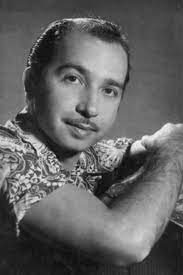
CARLOS PAULÍN
The outstanding actor Carlos Paulín had a long and fruitful artistic career, playing multiple characters, especially in radio and television programs. Born on May 15, 1922 in the area of Piloto, in Consolación Del Sur, in the province of Pinar del Río, his official name was Isidro Barredo Paulín.In 1934 the family moved to Havana when he was still a teenager. From a very young age he had artistic interests and began to join the radio stations in search of the possibility of acting and expressing himself through them.
He began acting on the radio as an amateur artist in 1937 on Radio COCO and Cadena Roja, as the protagonist of Charro Negro, which was about the life of Carlos Gardel.Three years later he entered as a professional actor in 1940 at CMQ radio station. In this medium he had the honor of working in the two most listened programs in the Cuban radio at that time, the Adventures of Tarzan and the novel The Right to be born.
When television was inaugurated in Cuba in 1950, Paulín played numerous leading roles in different dramatized programs. He particularly stood out in the programs Teatro ICRT, Grandes Novelas and El Cuento, as well as in a large number of adventures. Carlos Paulín also participated in the first television version of the novel El derecho de nacer and also acted in the Teatro Popular directed by Paco Alfonso, as well as in original works by novelist Alejo Carpentier.
He usually played his characters with a sober face and a deep, deep and convincing voice, which gave him a particularly personal artistic stamp. However, he also played humorous characters in which he was able to split himself into two, as was evident in the role of Panchón Majagua in the television program San Nicolás del Peladero. In the early sixties he directed novels by Félix Benjamin Caignet and José Angel Buesa, among other authors. In 1973 he participated in the Mexican film El santo oficio, in 1976 in the film Patty-Candela, in 1986 in Otra mujer and in 2002 in La Avería.
For his meritorious work he was awarded throughout his artistic career, the Alejo Carpentier Medals, the Laureate Worker of Culture and the Honor to the Merit of the Popular Theater, the Distinctions for the National Culture and the Raúl Gómez García, the condition of Artist of Merit of the Cuban Radio and Television, the Microphone of the Cuban Radio, the National Prize of Television and the 50th Anniversary Seal of the Cuban Television. He died in Havana on March 27, 2005.
It is the highest recognition given by the radio in Cuba. Professionals and technicians who have devoted their lives to the development and amplification of one of the most popular broadcasting media in the world are deserving of such high distinction. The award, established in 1992, is a prize for the committed and daily work of those who work in the media.